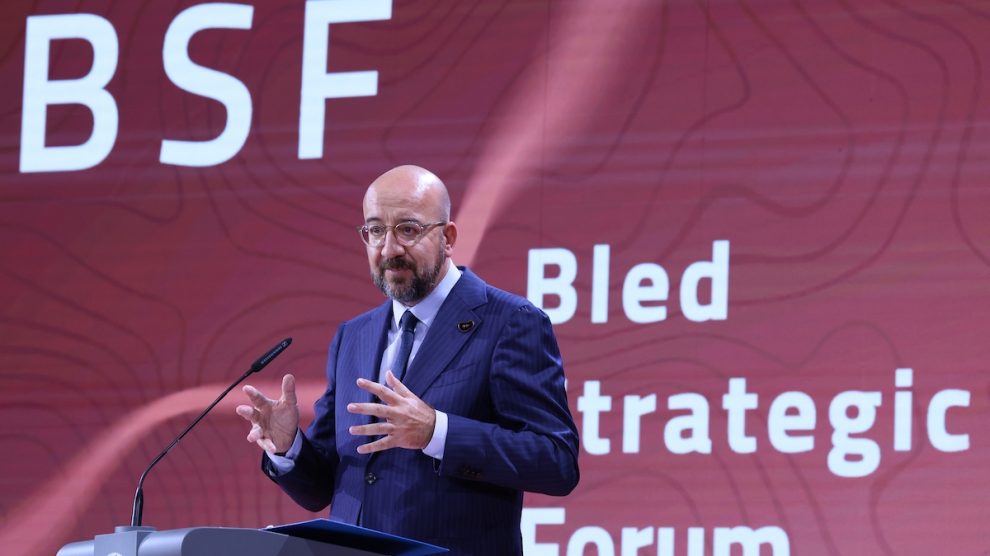EU Council President Charles Michel this week offered membership hopefuls plenty of sweet talk, but little substance.
The bakery at the Park Hotel in the Slovenian mountain resort of Bled has been making its celebrated kremna rezina, a custard and whipped cream puff pastry slice also known as kremšnita, for more than 70 years. More than 10 million have been served to visitors on the hotel’s terrace, as famous for its views over lake Bled as for its irresistible afternoon treat of coffee and cake.
Variations of the kremna rezina are served all over the former Yugoslavia, but all feature a generous dose of icing sugar sprinkled on top. Attendees from would-be EU member states at this week’s Bled Strategic Forum could be forgiven for departing the Slovenian town with the idea that Charles Michel, president of the European Council, had been equally generous with the coating of sugar he sprinkled over their membership hopes.
- Georgia’s unwavering enthusiasm for the EU
- Can the Three Seas Initiative be saved from irrelevance?
- ‘After the war, Ukrainian businesses will be far more international’
“To be stronger and safer, the EU needs to reinforce our bonds and become more powerful. That’s why it is now time to tackle the challenge of enlargement,” Michel told his audience, which included several prime ministers from would-be EU members, including Albania’s Edi Rama and Serbia’s Ana Brnabić.
Michel added that countries with a confirmed EU perspective should from now on be known as “future member states”.
“It’s time to get rid of the ambiguities. It’s time to face the challenges with clarity and honesty. The road to the EU for the Western Balkans began more than 20 years ago. A region at the heart of Europe, surrounded by the EU. It was also a region emerging from conflict after the break-up of Yugoslavia,” he said.
Both sides must be ready by 2030
Five of the six countries of the Western Balkans are EU candidates: North Macedonia, Montenegro, Serbia, Albania and Bosnia and Herzegovina. The exception is Kosovo.
Ukraine and Moldova became candidates in 2022. “The same status awaits Georgia when they complete the necessary steps,” said Michel. “Enlargement is no longer a dream. It is time to move forward.”
Admitting that there was still “a lot of work to do”, Michel said that for the EU to be “credible” there needed to be a clear agenda and timeline for enlargement.
“I believe we must be ready—on both sides—by 2030,” he said, flagging up the need for the EU to put its own house in order. French President Emmanuel Macron has for several years insisted that enlargement can only take place once the EU has itself carried out internal reform.
Speaking at an annual gathering of French ambassadors in Paris shortly after Michel had delivered his Bled speech, Macron warned that, “The risk is to think we can enlarge without reform. I can testify that it is hard enough for Europe to advance on sensitive topics with 27 members. With 32 or 35 members, it won’t be any easier.”
Macron also repeated his idea, first touted in 2019, of creating a “multi-speed Europe” in which different parts of the European Union should integrate at different levels and pace depending on the political situation in each individual country.
The idea has failed to find much support elsewhere in the bloc, particularly among member states in emerging Europe who fear being left on the margins.

Enlargement will remain merit-based
EU leaders will discuss enlargement at the next European Council meeting at Granada in Spain, set for October, where Michel is likely to propose opening accession negotiations with Ukraine and Moldova.
Slovenian Prime Minister Robert Golob, who also spoke in Bled, said that EU preparations for accession “must happen in the next 12 months or they will not happen for a very long time.” This echoed Michel’s view that, “The window of opportunity is open. We need to act on it.”
Nevertheless, as was made clear to Ukraine and Moldova last year after their applications were fast-tracked to candidate status, enlargement is and will remain a merit-based process, Michel added, highlighting the importance of shared values and the rule of law.
“Our union is founded on the fundamental values of human rights and dignity, democracy, and solidarity. The rule of law ensures we can live, work, create, and trade fairly in one big area of liberties. In full respect of our diversity. In the EU, each citizen, each company must trust that they will be treated fairly—wherever they live or do business. This includes respecting the rights of minorities.”
Michel also made it clear that he wants to see changes in accession procedures that will make it impossible for new members to block future member states.
“We need to make sure that past conflicts are not imported into the EU,” he said, in a remark that did not specifically mention Serbia and Kosovo but which was clearly intended to be heard in both countries.
Serbian PM Brnabić, who clashed in Bled over the status of Kosovo with the latter’s prime minister, Albin Kurti, later commented that the European Union often acted as if “anything [the Western Balkans] do is not good enough.”
Albania’s Edi Rama was also sceptical, saying that he “appreciated the gesture” of setting 2030 as a target while recognising that accession “could take a lot longer”.
To keep the Western Balkans sweet, the EU will clearly need more sugar.
Photo: Charles Michel at the Bled Strategic Forum. © European Union.
Unlike many news and information platforms, Emerging Europe is free to read, and always will be. There is no paywall here. We are independent, not affiliated with nor representing any political party or business organisation. We want the very best for emerging Europe, nothing more, nothing less. Your support will help us continue to spread the word about this amazing region.
You can contribute here. Thank you.


